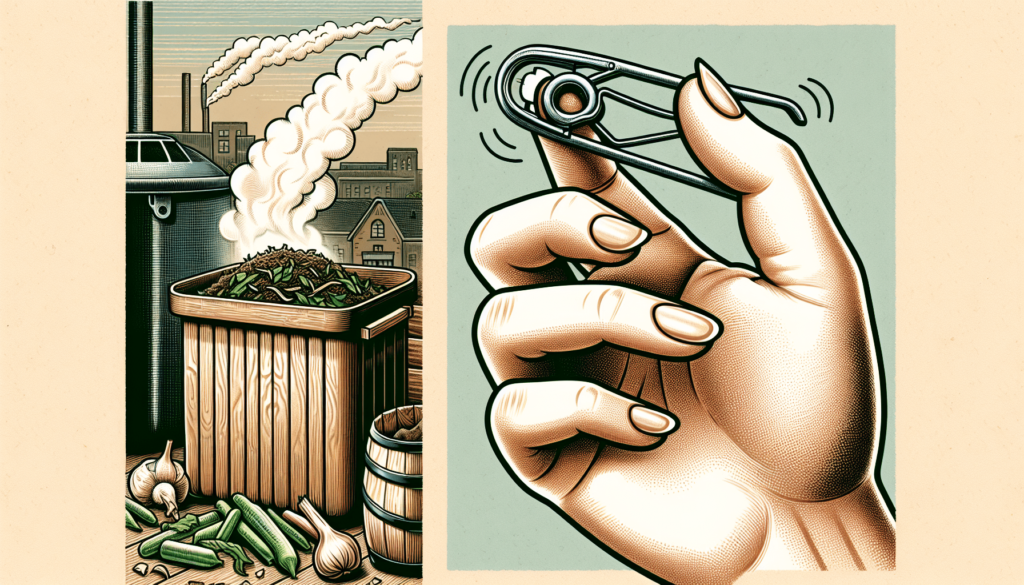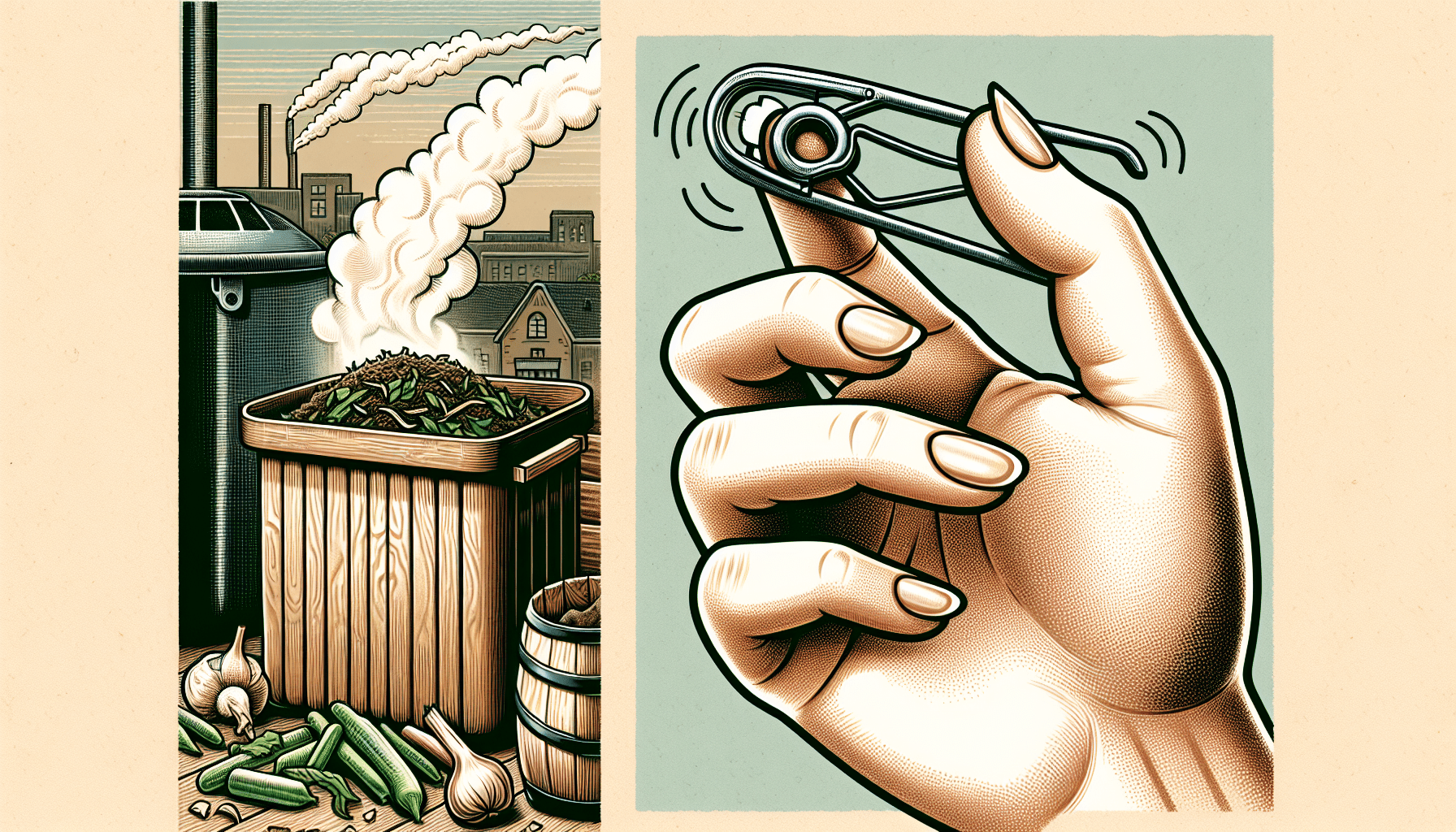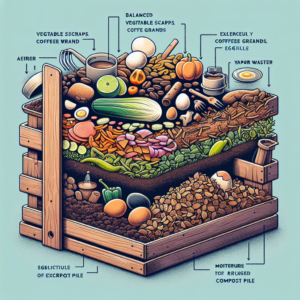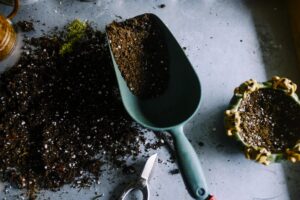Have you ever wondered how to keep those unpleasant odors at bay in your compost bin? Look no further! In this article, we’ve got you covered with some handy tips and tricks to help manage those pesky smells. Whether you’re a seasoned compost enthusiast or just getting started, we understand the importance of keeping your compost area smelling fresh and inviting. So, let’s dig in and discover how to tackle odors in your compost bin effectively!

Choose the Right Compost Bin
When it comes to composting, choosing the right bin is crucial for maximizing composting efficiency and minimizing odors. One important factor to consider is the size and design of the compost bin. The bin should be large enough to accommodate the amount of compostable materials you generate, but not so large that it becomes difficult to manage. A bin that is too small can lead to overcrowding and improper decomposition, while a bin that is too large may not provide enough aeration.
In addition to size, the design of the bin is equally important. Opt for a compost bin with good ventilation to facilitate airflow and prevent the accumulation of excess moisture. Good ventilation helps prevent anaerobic conditions, which can result in foul odors. Look for a bin with plenty of openings or a design that allows for air circulation.
Lastly, select a bin with a tight-fitting lid. This will help contain odors and prevent unwanted pests from accessing your compost. A secure lid is especially important if you plan on composting food scraps, as they can be particularly attractive to pests.
Balance the Compost Ingredients
Achieving the right balance of compost ingredients is key to maintaining a healthy and odor-free compost pile. One essential aspect of this balance is maintaining a proper carbon-to-nitrogen ratio. This ratio should ideally be around 30:1, with carbon-rich “brown” materials like dried leaves, wood chips, and straw, and nitrogen-rich “green” materials such as grass clippings and fruit scraps.
It’s important to avoid adding too much wet or green materials, as this can lead to excess moisture and unpleasant odors. If your compost bin becomes too wet, add dry or brown materials to absorb the excess moisture and restore the balance. These brown materials act as a bulking agent and help in absorbing excess moisture, preventing the compost from becoming soggy and smelly.
Avoid Certain Odorous Items
While composting is a great way to reduce waste, not all items are suitable for the compost bin, especially those that can produce odors. Avoid adding meat, dairy, or oily products to your compost bin, as they can attract pests and create foul smells. Additionally, keeping out pet waste and litter is essential to maintaining a pleasant composting environment.
Certain items, such as citrus peels or onions, can add their own distinct odors to the compost pile. While they may not be as offensive as meat or dairy products, it’s best to avoid adding them if you’re particularly sensitive to smells or are aiming for an odor-free compost bin.
Cover Food Scraps Properly
Food scraps are an excellent source of nutrients for your compost, but they can also contribute to unpleasant odors if not managed properly. One effective way to control food scrap odors is to place them in a covered container before adding them to the compost bin. This prevents the release of odor-causing compounds and helps contain any existing odors.
Using newspaper or compostable bags to wrap food scraps can also help prevent odors. These materials act as a barrier, trapping any smells and preventing them from escaping. Avoid leaving uncovered food scraps exposed for an extended period, as this can lead to increased odors and pest attraction.
Regularly Turn and Mix the Compost
To ensure proper decomposition and minimize odors, it’s essential to regularly turn and mix the compost pile. Turning the compost helps in aerating the pile, providing oxygen to the microorganisms responsible for decomposition. This circulation of oxygen helps prevent anaerobic conditions, which can lead to unpleasant odors.
When turning the compost, make sure to mix the compost ingredients thoroughly. This helps in distributing moisture evenly and promotes the breakdown of organic matter. Break down any clumps or compacted layers that may have formed to ensure efficient decomposition and reduce the risk of odors.
Add Activators or Accelerators
If you’re looking to speed up the decomposition process and minimize odors, you can consider adding activators or accelerators to your compost bin. Compost activators, such as manure or kitchen scraps rich in nitrogen, introduce beneficial microorganisms to the pile, which help break down the organic matter more quickly. This can result in faster composting and fewer odors.
In some cases, you may find it necessary to use commercial compost accelerators. These products are specifically designed to optimize the composting process and may contain a blend of microorganisms, enzymes, and other ingredients that promote decomposition. While not essential, they can be helpful in achieving efficient composting and controlling odors.
Control Moisture Levels
Proper moisture levels are vital for a healthy compost pile and odor control. Aim for a moisture content of around 40-60%. Moisture that is too high can lead to a smelly, anaerobic environment, while excessive dryness can slow down the decomposition process.
Regularly monitor the moisture levels in your compost bin and adjust as needed. If the compost appears too dry, add water in moderation. On the other hand, if the compost is excessively wet, incorporate dry materials such as dried leaves or wood chips to absorb the excess moisture.
Choose an Appropriate Location
The location of your compost bin also plays a role in odor control. It’s important to place the bin in a well-ventilated area to facilitate airflow and prevent the accumulation of odors. Avoid placing the compost bin too close to your house or windows, as any potential odors may waft in.
Furthermore, consider positioning the compost bin away from neighbors and public areas. While composting is a sustainable practice, some individuals may not appreciate the odors associated with composting. By placing the bin in a discreet location, you can minimize any potential conflicts while still enjoying the benefits of composting.
Cover the Compost Pile with a Layer of Browns
To further control odors in your compost pile, it’s beneficial to cover the top layer with dry or brown materials. This layer acts as a physical barrier, helping to contain odors and prevent pests from being attracted to the compost.
There are several materials you can use to cover the compost pile, such as dry leaves, straw, or wood chips. These materials are not only effective at reducing odors but also provide additional carbon-rich matter for the decomposition process. By incorporating this layer of browns, you create a more balanced, odor-free composting environment.
Regular Maintenance and Monitoring
Lastly, regular maintenance and monitoring are essential for managing odors in your compost bin. Regularly inspect the compost bin to identify any potential odor-causing materials, such as spoiled food or excessive moisture. Remove these materials promptly to prevent the proliferation of odors.
In addition, regularly assess the compost conditions and make any necessary amendments. Adjust the moisture levels, turn the compost, and add more compostable materials or activators as needed. By staying proactive and attentive to your compost bin, you can maintain a healthy, odor-free environment for efficient composting.
In conclusion, managing odors in your compost bin requires careful consideration of various factors. Choosing the right bin, balancing compost ingredients, avoiding odorous items, covering food scraps properly, regularly turning and mixing the compost, adding activators or accelerators, controlling moisture levels, selecting an appropriate location, covering the compost pile with a layer of browns, and regular maintenance and monitoring are all crucial steps in achieving an odor-free composting experience. By following these guidelines, you can enjoy the benefits of composting while keeping odors at bay. Happy composting!




